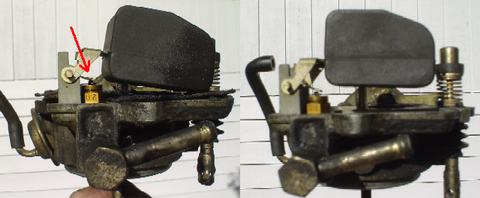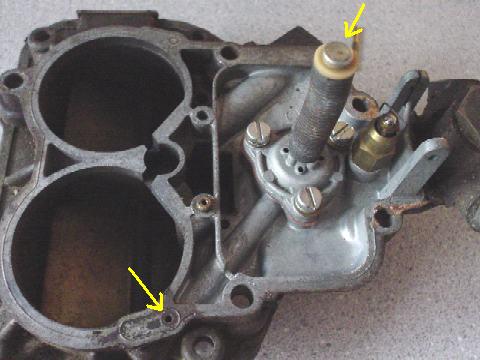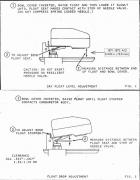| Revision as of 05:37, 17 September 2010 ddgonzal (Talk | contribs) (->ddgonzal's 'Quick Rebuild' method) <- Previous diff |
Revision as of 23:08, 11 January 2012 ddgonzal (Talk | contribs) Next diff -> |
||
| Line 1: | Line 1: | ||
| - | When the engine is running, look at the '''float glass''', make sure the level is right. If it's not very close to the center line of the glass, you'll need to take the carb apart to adjust the float level (assuming you've already tested the Fuel Pump per above). A manual will be useful here. I briefly describe this below. | + | When the engine is running, look at the '''float glass''', make sure the level is right. If it's not within 1 mm center line of the glass, you'll need to take the carb apart to adjust the float level. A manual will be useful here. I briefly describe this below. |
| + | |||
| + | = Overvew = | ||
| + | IMPORTANT: High fuel pump pressure can cause a high float, so if it is high, perform the [[Fuel pump pressure test]] first -- before taking the carb apart to adjust the Float Level. | ||
| Rebuilding a stock Hitachi is not too difficult '''if you are careful and patient''', so why pay somebody to do it? OK, if you are not patient, hire a good expert to do it for you. | Rebuilding a stock Hitachi is not too difficult '''if you are careful and patient''', so why pay somebody to do it? OK, if you are not patient, hire a good expert to do it for you. | ||
Revision as of 23:08, 11 January 2012
When the engine is running, look at the float glass, make sure the level is right. If it's not within 1 mm center line of the glass, you'll need to take the carb apart to adjust the float level. A manual will be useful here. I briefly describe this below.
Overvew
IMPORTANT: High fuel pump pressure can cause a high float, so if it is high, perform the Fuel pump pressure test first -- before taking the carb apart to adjust the Float Level.
Rebuilding a stock Hitachi is not too difficult if you are careful and patient, so why pay somebody to do it? OK, if you are not patient, hire a good expert to do it for you.
It doesn't usually cost much either. You may not even need new gaskets, even 20-year old ones are often resuable. Or you can get a "rebuild kit", but I think that's not usually worth it. The most you'd need is the top (float chamber) gasket, and that only if it tears.
ddgonzal's 'Quick Rebuild' method
I've taken to just doing quick clean and inspect. You don't even necessarily need to take the carb off the manifold (makes it easy, not throttle linkage and wires to disconnect). The keys are to success are:
- Be careful taking the top off, note where the parts go
- Be careful of parts "flying off" or "falling out"
- Take the top off
- remove pump lever cotter pin. The hardest part is disconnecting the throttle pump linkage on the outside of the carb. This is the long lever along the top of the carb and rods that connect the throttle to the pump. There are also small clips that hold the levers. Be careful and don't lose them
- remove choke linkage cotter pin
- remove and plug fuel line
- remove choke pull-off hose
- remove the top screws
- Rinse the insides off with carb cleaner. Spray carb cleaner through every passageway to make sure they are clear
- Unscrew the idle mixture screw and blow through that passage. Screw it back in the same number of turns (two turns is a good starting point if you're not sure)
- Don't take the throttle plate off the carb. There is almost never a need for that
- If the float level was incorrect before (see above) adjust it now (see below)
- Test the power valve by using a bit of hose to suck on the right passage.
- Put the top back on. Just tighten the bolts enough to compress the lock washers. No more.
Float Level Adjustment
Quick and Dirty way of adjusting float level:
1. Take carb top off (see above)
2. turn top upside down (level).
3. The floats should hang with .418 inch space per the diagram below Carb float-level
Carb float-level
- if necessary to adjust float, bend the tang under the float pivot pin. Any 1200 repair book should explain how to do this if you are not sure

![[Datsun 1200 encyclopedia]](/wiki/upload/wiki.png)


